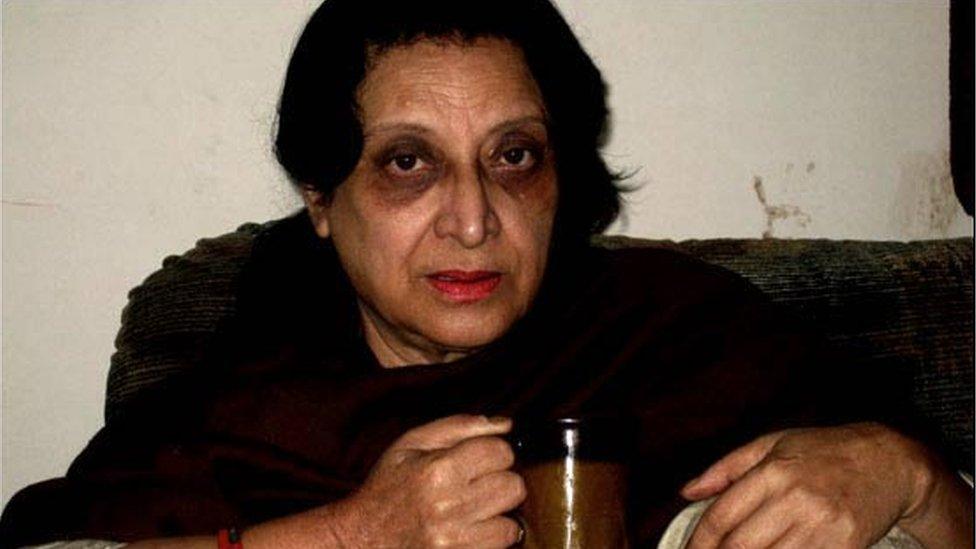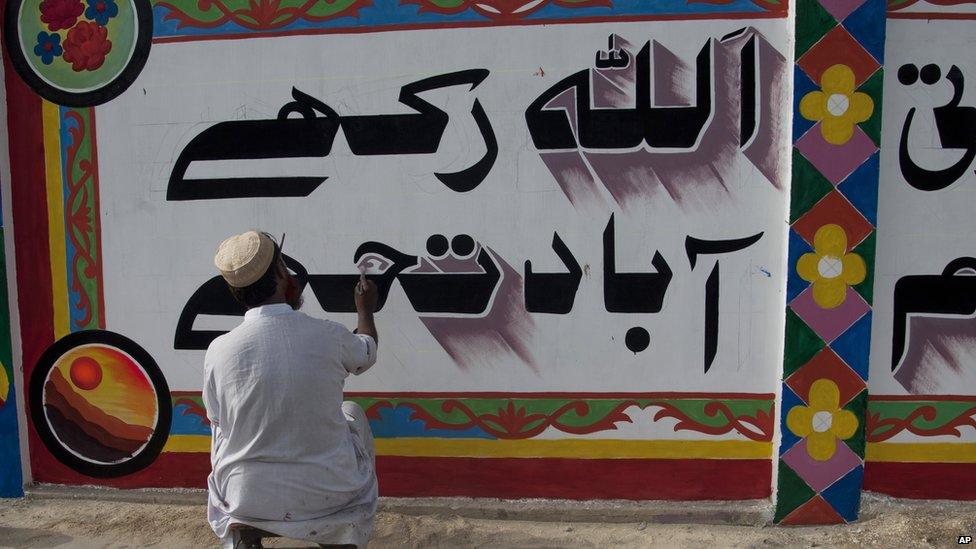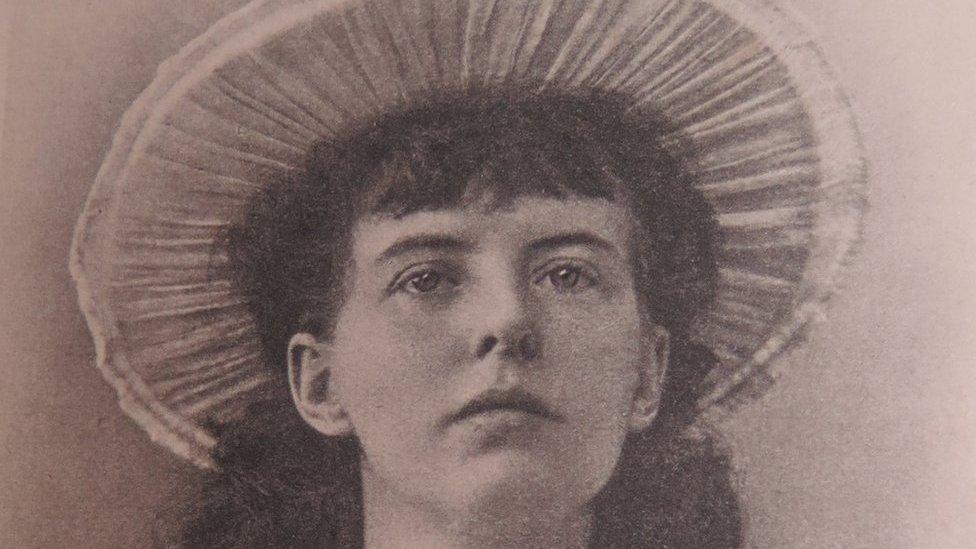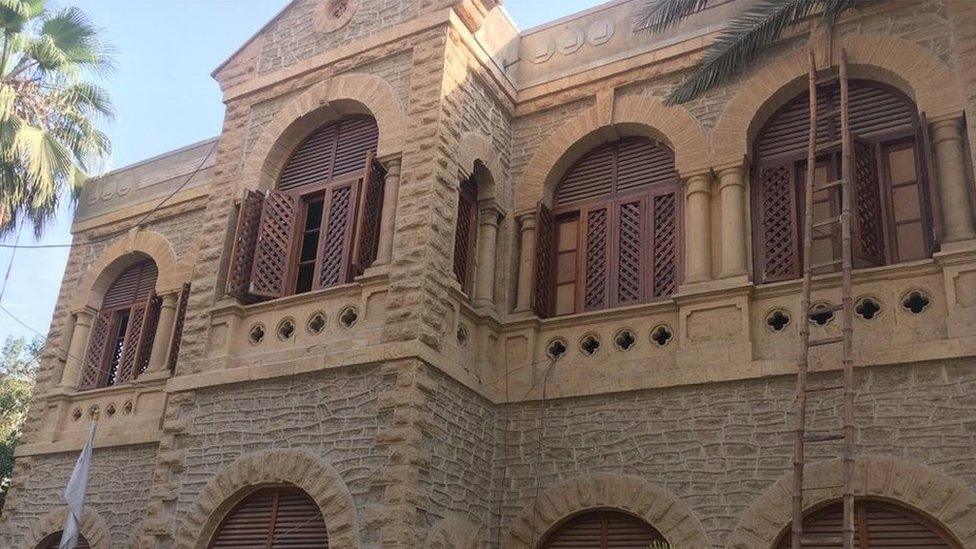Fahmida Riaz: Pakistan poet who dared to talk about female desire
- Published

Fahmida Riaz, who died in Pakistan last week, was not just another poet, fiction writer or translator. She broke social taboos and set new standards in Urdu literature, writes M Ilyas Khan.
Riaz was a compulsive political animal who unapologetically lived her ideology rather than bend it to the demands of different situations.
Born in what is now the Indian city of Meerut, on 26 July 1946, she was raised in the Pakistani city of Hyderabad where her father was posted around the time of the partition of India in 1947.
The family stayed in Pakistan but her literature would later cross the divide between the two countries.
The poet in Riaz came of age quite early, in 1967, when her first collection was published.
Paththar Ki Zaban (Tongue of Stone) displayed early traces of a feminist consciousness that would rip through Pakistan's culture of patriarchy six years later with the publication of her second collection, Badan Dareeda (Torn Flesh).
When that work emerged in 1973, all hell broke loose. Though Islamist militants were still some years from taking over the religious narrative in the country, conservative literary critics accused her of writing pornography.
She said she was just writing what she felt as a woman, and that there was no reason why she couldn't express herself when men encountered no such resistance.
But even in the celebration of her womanhood, she was aware of the threat she was posing to the fragile but revered "idols" of a conservative society.
Her fears are apparent in the short poem Pehla Pyar (First Love).
"First time, after love, in each other's arms; in the mirror chamber of our mental and physical nudity, so frail, so delicate; so reluctantly we breathe, lest we break the glass idols," the poem reads.
Though there had been women poets before her, these lines directly addressed female sexuality in a way no other female writer in Pakistan had previously.
And it set the tone for those who came after her - like Perveen Shakir, who was killed in a road accident, or Azra Abbas, the wife of a former BBC Urdu journalist.
"Women writers are full of thoughts but only half of them are articulated, while male writers do not have as many thoughts but all of them are articulated," Noorul Huda Shah, the writer and playwright, said in 2016. "Fahmida articulated all her ideas and thoughts, which is commendable."
But since her heyday, Pakistani society has moved backwards with the rise of an extremist religious, male-dominated narrative. And so her message today sounds as rebellious as when it was fresh.
And unlike other women poets of her time, Riaz also had a political side which influenced her work.
Her political consciousness began with a students' movement that opposed a ban on student unions imposed by the first military regime of Ayub Khan in the 1960s.
Some of this consciousness was reflected in her first collection of poetry, indicating her inclination towards the left-wing progressive movement.
Between the publication of her first two collections she lived in London, but returned to Karachi after a divorce. She arrived during a tumultuous period in Pakistan's history.
Bangladesh had just seceded and a leftist party, the PPP, had risen to power. It soon caused a rift within the progressive movement by dismissing two left-wing provincial governments of the National Awami Party (NAP), triggering an armed insurgency in Balochistan.
For Riaz, the moment to decide which side to opt for came when the PPP government ordered the police to open fire on a NAP rally in Rawalpindi in March 1973.
Below is an excerpt from her poem that was widely read at the time.

How suddenly a brisk wind blew from the west today; how blood arose from under the dust, madly whirling through the streets, hugging pedestrians, banging against closed doors, waving like a flag over the town.
Today my fears left me suddenly. Today my chest is thirsting for blood, I want to dance like a tornado.
Come my countrymen, dance a dance of anger, of unfurling imagination, of grief and infamy, of a hope repentant. Tear off all your vestments of convenience, wade through the showers of your tears, raise your reluctant arms in the air and let your body swirl in dance.
City after city as we go dancing, circle after circle will the whirlpools form.

She not only threw her lot with Baloch and Sindhi nationalists, she married a Sindhi Marxist who had been associated with the NAP movement. They moved in together and had two children, a boy and a girl. She already had a daughter, who now lives in the US, from her first marriage.
Soon after their marriage, the couple started a political magazine called Awaz, which lasted until the PPP government was toppled and the succeeding military regime of Gen Ziaul Haq banned it.
The couple were charged with treason. Riaz's husband was arrested and put in jail while she, along with her two children and a sister, was able to slip into India where her husband joined them later. The family lived in self-imposed exile in Delhi for almost seven years until democracy returned to Pakistan.
Though primarily known as a poet, Fahmida Riaz has written a number of critically acclaimed novels. Her mastery of English, Hindi, Sindhi, Persian and some Arabic enabled her to also translate both classical Sufi and Eastern European literature into Urdu.

More from Ilyas

Since her husband couldn't secure any permanent gainful employment, Fahmida Riaz bore much of the financial burden of putting food on the table.
But she was in and out of jobs because of her strongly held views. These jobs were mostly at various government-owned literary organisations, and she held them mostly when the PPP was in power.
In 2007, her 26-year-old son drowned in the US where he had gone to study. Some five years ago, her husband suffered paralysis and became bedridden.
Riaz herself was diagnosed with auto-immune syndrome last year, and since then had been living with her daughter, a doctor, in Lahore.
When she died on 22 November, there was much uncertainty over whether her body would be carried to her native city of Karachi for burial. But the family decided to bury her in Lahore.
She had continued, in her final years, to comment on literature, history and politics via Facebook. But on 29 August 2017, the page went silent.
In one of her last posts Riaz described the war going on in her body.
"Half of your body launches attacks on the other half. But the other half does resist too. And so sometimes it's one half that wins and sometimes it's the other," she wrote.
"I have no complaints that it wasn't diagnosed earlier. Actually, I sometimes smile when I think about it. It is a very sophisticated psychological way of committing suicide."
Poems translated by M Ilyas Khan.
- Published12 September 2015

- Published11 November 2018

- Published19 November 2018
